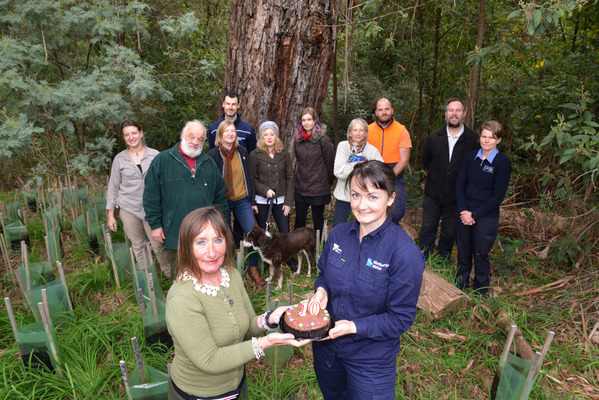
By Derek Schlennstedt
Mount Evelyn Environment Protection and Progress Association (MEEPA) and Melbourne Water are celebrating their 10-year partnership to help restore the Mount Evelyn Recreation Reserve.
In an incredible testament to their hard work in revegetating the reserve, yellow-bellied gliders – not seen in the area for over 60 years – were recently discovered again in the area.
Claire Worsnop, president of MEEPA, said it was only within the last few months that the team at MEEPA had sighted the rare gliders.
“We have very recently seen yellow-bellied gliders which haven’t been noted here since the 1950s,” she said.
“These are the little joys we get which tell us that what we’re doing is really good and should be continued, and that everyone should all be looking at doing that work in other areas so the younger generations can enjoy these special animals, too.”
The milestone marks a decade of both organisations working to revegetate the location to promote the growth of indigenous plants and to attract native species back to the location.
Claire said both MEEPA and Melbourne Water were proud of the milestone and that various flora and fauna had returned to the reserve in recent years.
“Ten years is pretty amazing and Melbourne Water thinks that, too,” she said.
“We’ve seen a huge change, in the return of many species of animals to the area, and the breeding of animals has increased.”
Responsible for reducing weeds that grow along Olinda Creek and in the reserve, MEEPA have been eradicating exotic weed species, removing rubbish and re-planting indigenous trees, which, without the help of Melbourne Water, would not have been possible.
“(There’s been) $138,000 from Melbourne Water in that time and so we’ve been able to do a lot of work with the help of our volunteers to match those funds,” she said.
“We’ve removed ground weeds like holly and blackberries and that has allowed natural regeneration to occur.
“We get these lovely little surprises, we get rare orchids that we haven’t seen in years, and that doesn’t mean they are not there – it just means the weeds have been removed so now they can come forward.”






